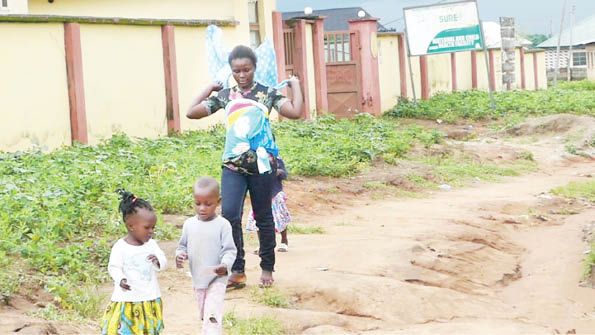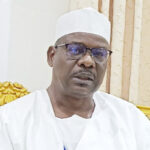Already with two boys, Fatima’s third pregnancy was a joy, a girl was on the way.
At 24, housewife to a trader husband Aliyu on Jalam street in the Bauchi council area of Bauchi state, she looked happy.
In the 38th week, she went into labour. She was scheduled to give birth at home with her aunties around to help her. It was the practice.
Time ran, the labour was prolonged, there was an obstruction, the baby was not descending.
The nearest hospital was too far, and a vehicle to take her there was not available.
The home of a traditional birth attendant (TBA) seemed closer. Fatima’s treatment began with an infusion of local herbs.
She died along with the baby after 14 hours of intense labour.
It is estimated that for every 20 live births, there is one Fatima.
Up to 59,000 women die each year, giving birth, that’s around 162 women every day.
A Nigerian woman is 500 times more likely to die during childbirth. The country ranks second after India in the world, and first in Africa.
The dilemma has been prevalent in Nigeria for a long time, caused by a number of factors that have come to be referred to as “the three delays” in deciding to seek care, getting to the point of care, and getting adequate care.
The Giving Birth in Nigeria programme seeks to understand exactly why Nigerian women die while giving birth in communities.
Between May 2019 and May 2020, 133 women died giving birth in the affected areas.
The review found 52 deaths took place at home, 28 in the home of a traditional birth attendant, 18 in a faith-based institution and 17 in a health facility.
The communities were selected from one state in each geopolitical zone for spread; Bauchi, Bayelsa, Kebbi, Lagos, Ebonyi and Niger States.
Launched on Monday, 30 November, 2020, the findings are contained in a report titled: “Why women are Dying While Giving Birth in Nigeria?”
The report was anchored by a consortium consisting of Africare, Nigeria Health Watch and EpiAFRIC implemented the 18-month community maternal death review programme, supported by funding from MSD from Mothers.
All the communities surveyed have never been reviewed with regards to maternal deaths. The report indicates the need for media advocacy targeted at convincing women, their families, community members and community leaders on the importance of seeking better maternal health outcomes.
Nafisa Ahmad produces a radio health show on Express Radio in Kano. Its name “Ranar wanka ba a boyin cibi” translates to “You don’t hide the navel when taking a bath”.
“When you are talking about maternal health, you need to talk about everything,” she explains.
The programme opens vox-pop lines for listeners to speak of their experiences while visiting health care centres.
“It is not me saying what the problems are. It is talking to the service provider, to the policy maker also, and getting to understand the issues from the people, those getting the service, getting them to access the care and to speak about their experiences.”
Some of the best health outcomes start from getting stakeholders’ interest. In the communities, there are a lot of the decisions to go to a health facility—from attending antenatal care to giving birth. These decisions are not in the hands of the pregnant woman.
Getting these leaders “can lead the drive toward an increased uptake of facility-based maternal health care,” recommends the report.
The report speaks of an existing knowledge gap in safe motherhood and maternal health care practices among “women, men and religious, community and traditional leaders in communities”.
It calls for advocacy drives at the community or ward level with the help of an already existing local government health education departments in partnership with community leaders and community-based organisations.
These stakeholders are also crucial when it comes to service delivery. For years, Ruqayyah Manga has worked on and trained health care workers using a curriculum approved by the Nursing and Midwifery Council of Nigeria.
She says much of the curriculum for health education differs in theory and in practice.
“When you train someone in the classroom, you have read the textbook and seen it on the internet. The student has got a formed perception. When they go to the clinical area, these things are not there. How can they reduce maternal mortality? ” asks Manga.
She says that the disconnect in health education between teaching materials and clinical practice needs fixing to incorporate all the real-life factors that predispose women to the dangers of childbirth—and how to ameliorate them. For health students and educators, her call is for “training and retraining”.
“It isn’t just the health educators. The community has to come in to assist them. To reduce maternal mortality rate, the community has to participate in it.”
The report recommends prioritising and facilitating health education through a bottom-up approach, starting from the household to the community level.
“Religion and cultural beliefs play a significant role in maternal health care practices, therefore, family units, community influencers and religious and traditional leaders should be trained on encouraging women to seek better health-seeking decisions and actions to present better maternal health outcomes,” the report recommends.
For the 133 women who have become statistics in their community, it makes all the difference. Fatima and the five other women named in the ‘Why Are Women Dying While Giving Birth in Nigeria?’ report are putting a face to their deaths.

 Join Daily Trust WhatsApp Community For Quick Access To News and Happenings Around You.
Join Daily Trust WhatsApp Community For Quick Access To News and Happenings Around You.


